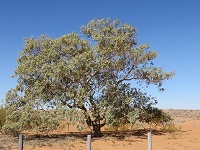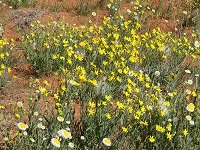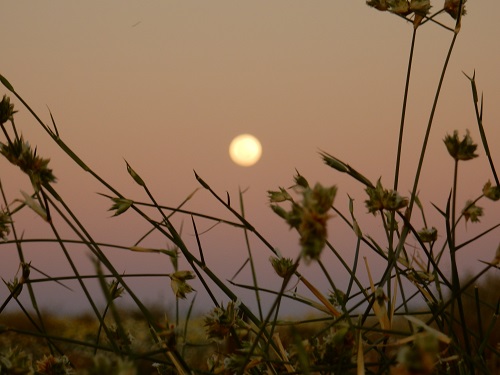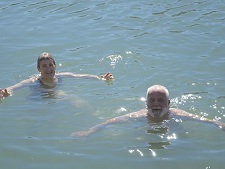We woke once again to a setting moon. Continue reading Simpson Desert crossing 4: Day 3
Category Archives: Life
Saturday salon 8/11

An open thread where, at your leisure, you can discuss anything you like, well, within reason and the Comments Policy. Include here news and views, plus any notable personal experiences from the week and the weekend.
For climate topics please use the most recent Climate clippings.
The gentleman in the image is Voltaire, who for a time graced the court of Frederick II of Prussia, known as Frederick the Great. King Fred loved to talk about the universe and everything at the end of a day’s work. He also used the salons of Berlin to get feedback in the development of public policy.
Fred would only talk in French; he regarded German as barbaric. Here we’ll use English.
The thread will be a stoush-free zone. The Comments Policy says:
The aim [of this site] is to provide a venue for people to contribute and to engage in a civil and respectful manner.
Here are a few bits and pieces that came to my attention last week.
At the end of the week the star turn was Jacqui Lambie digging in over defense pay, lashing out at Abbott and taunting Clive palmer, daring him to sack her.
Glenn Lazarus has directly urged soldiers to ignore his colleague Jacqui Lambie and her call to protest at Remembrance Day ceremonies as Clive Palmer struggled to keep his disparate group of Senators together on Friday.
But a defiant Senator Lambie taunted leader Clive Palmer to prevent the party from splitting in the Senate and challenged her colleagues to help her block all Government legislation until the Defence Force is given a better pay rise.
Lazarus:
“Do not turn your back on any Remembrance Day activity or ceremony. Honour and respect those who have given the ultimate sacrifice,” he said.
“I married into a defence family and I understand firsthand the challenges defence personnel and their families deal with and the sacrifices they make for this country.
“Remembrance Day should be above politics,” he said.
It’s possible to feel sorry for Clive Palmer!
2. Whitlam remembered

David Marr says there was lingering sadness along with cheers and soaring oratory. I heard parts of it. I particularly liked John Faulkner’s speech, also his son Tony. Everyone has been raving about Noel Pearson’s speech. From what I’ve read he said some good stuff, but sounded stagy, self-consciously the orator.
Abbott and Howard were booed on entry, as is proper, Julia Gillard was welcomed effusively, Kevin Rudd in silence.
Lenore Taylor warns that right now Whitlam’s legacy in schools and universities is being dismantled.
3. Is the media biased, or not?
Let’s try a thought experiment: imagine the Rudd government had, within a few short months of being elected, fallen significantly behind Brendan Nelson’s opposition in the polls; imagine that it had produced a budget universally panned as unfair, one that it struggled to get through the Senate, that Cabinet was leaking like a sieve without any wire mesh, that treasurer Wayne Swan had made repeated gaffes and been forced to apologise and was widely regarded as a growing liability, that corruption in the NSW Labor Party had forced a Labor minister to stand aside within months of being sworn in, that Kevin Rudd had consistently negative personal ratings and at times fell behind Nelson as preferred PM, that Rudd was so unpopular, state Labor leaders preferred he kept away from them during their election campaigns, that Labor had announced it was doubling the budget deficit, and if it was reliant on a political freak show of independent and minor party senators to secure passage of its bills.
And imagine if the Rudd government had resorted to national security in an effort to take the focus off its domestic woes, and it had failed to restore its fortunes, leaving it still trailing the Coalition?
Now imagine how all that would have been reported — and not just by the Coalition cheerleaders at News Corp, but by the entire media? You wouldn’t have been able to click on a news website without seeing “debacle”, “crisis”, “fiasco” and “Whitlamesque” in every political story.
4. Stop the ABC!
So here’s a reminder of why there’s ongoing bleating in the commercial media about the ABC:
1. Insiders (ABC 216,000 + 108,000 on News 24) — 324,000
2. Weekend Sunrise (Seven) — 305,000
3. Landline (ABC) — 291,000
4. Weekend Today (Nine) — 237,000
5. Offsiders (ABC) — 138,000
6. The Bolt Report (Ten) — 131,000
7. Financial Review Sunday (Nine) — 130,000
8. The Bolt Report repeat (Ten) — 84,000Poor Bolter. It’s a truth universally noted that once a program hits a level, it usually stays at that level.
Here’s the wonderful David Rowe cartoon at the head of the post:
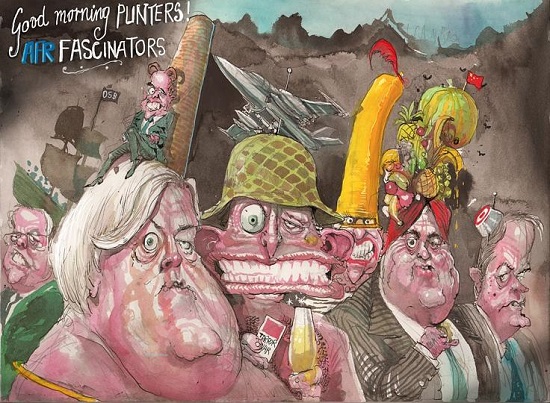
5. Business leaders lose confidence in Abbott Government
Only on the ABC:
The Prime Minister Tony Abbott likes to boast that Australia is open for business, but his government appears to be losing friends at the big end of town.
A survey from Institute of Company Directors has found the nation’s most powerful board rooms are not happy with the Coalition’s performance.
Their confidence in the Government has slumped to the lowest level seen since last year’s election.
company directors are saying that government decisions are hurting their businesses and hurting their customers, hurting consumer confidence as well.
6. A busy week
Last week was a busy week for me, the next one will be also. Moreover, I could be out three nights which will nearly halve the time I have for posting. We’ll see how it goes!
Simpson Desert crossing 3: Day 2
Mt Dare, Dalhousie Springs and Purni Bore are all in the Witjira National Park. Early on Day 2 we crossed into the Simpson Desert Regional Reserve, the main practical difference to us being that we could now have a camp fire. Within the first hour we came upon the man with his front wheel off I mentioned in this post: Continue reading Simpson Desert crossing 3: Day 2
Saturday salon 1/11

An open thread where, at your leisure, you can discuss anything you like, well, within reason and the Comments Policy. Include here news and views, plus any notable personal experiences from the week and the weekend.
For climate topics please use the most recent Climate clippings.
The gentleman in the image is Voltaire, who for a time graced the court of Frederick II of Prussia, known as Frederick the Great. King Fred loved to talk about the universe and everything at the end of a day’s work. He also used the salons of Berlin to get feedback in the development of public policy.
Fred would only talk in French; he regarded German as barbaric. Here we’ll use English.
The thread will be a stoush-free zone. The Comments Policy says:
The aim [of this site] is to provide a venue for people to contribute and to engage in a civil and respectful manner.
Here are a few bits and pieces that came to my attention last week.
1. Sleep study
Overnight I’m going into hospital to have a sleep study done. My wife reckoned I stopped breathing the other night, so I thought I’d better get it checked out. I reckon I’m just a shallow breather when I’m not snoring, so we’ll see.
2. Ambulance and emergencies
Our little household has been quite sick this week. It started with our 27 year-old son, who was tired and run down, having just handed in his maths honours thesis. On Sunday night about 10pm he came down with a severe gastric upset – diarrhoea and vomiting. He was really bad, barely able to stand, going numb in his hands and feet, severe stomach cramps. We decided to call an ambulance about midnight.
After a medical officer interviewed us and him, the decision was apparently that he was not in danger of dying, so it might take a while.
Two hours later, we cancelled the ambulance and took him to the Wesley, which is about 10 minutes away. There he was seen immediately. A couple of hours later and he was back home.
It costs a maximum of $250 with Medicare, plus drugs and tests.
If we’d stuck with the public system, he would have been further triaged once the ambulance got him to the hospital.
We definitely have a two-tier medical system.
30 hours later my wife took ill, and 36 hours later so did I, both not as bad as our son. We are all on the mend, though it’s taking a while to regain full strength.
3. ALP set to win in Victoria
Premier Denis Napthine looks like becoming a oncer. The new Ipsos poll, replacing Nielsen in the Fairfax stable has the ALP ahead 56-44. Poll Bludger at Crikey reckons that’s a bit of an outlier.
However, this result is something of a puzzle, in being the odd man out in a crowded Victorian market over the past few days — Galaxy, Essential Research, ReachTEL and Morgan all having proved of one mind in showing Labor’s lead in the range of 52-48 to 53-47.
Seems there are two problems. Firstly, there’s an unusually high Greens vote, without a compensating lower vote for Labor, which no-one quite believes.
Secondly it’s how you allocate preferences. Ipsos did it two ways, by asking the people polled, and according to the 2010 election. The former produces the higher result for Labor, but may not be valid, because there is no effect of how to vote cards. Fairfax grabbed the higher number.
But for complex reasons to do with an unusual preference flow in 2010, Poll Bludger reckons the other polls might show the Libs as about one percentage point higher than they really are.
4. Labor flirts with boats turnback policy
Labor spokesman Richard Marles on immigration flirted with the idea of turning back boats to Indonesia, “if it was safe and didn’t affect Australia’s relationship with Indonesia.” In other words, with Indonesia’s cooperation.
I’ve been wondering whether there hasn’t been back-door cooperation with the LNP Governments turnback policy and what the new prez in Indonesia will have to say.
It does seem, however, that having an open mind on the matter was too much for the left within the ALP, so Shorten has gently slapped him down.
I seem to recall that Frank Brennan walked down the Marles path at the time Rudd announced his PNG solution, much to the consternation of his admirers. My recall is, however, that Brennan saw a much more full-blooded cooperation with Indonesia and other regional powers, setting up an orderly queue there, with increased assistance for asylum seekers to be treated decently in Indonesia, and taking more of our refugee quota from that source.
If the sea crossing is dangerous, which it is, we could take Clive Palmer’s advice and fly them all to Australia. Why don’t the Greens adopt that policy? It’s logical!
The point is that she shouldn’t have been.
The NT senator has broken her silence on the claims, saying she has “done nothing wrong”.
Making a statement to the Senate on Thursday, she said the claims were “baseless” and were connected to a family dispute.
“I have done nothing wrong,” she said.
“It pains me to have to talk about my private life. But the publication of my emails is part of a very difficult child access and financial estate dispute,” she said.
Audio: Nova Peris says explicit email leak was part of a blackmail attempt (PM)She said the “aggrieved party” in the dispute contacted her by email 10 days before the emails were published to reveal “he had in his possessions a folder of information pertaining to Mr Boldon’s visit to Australia”.
“I did not realise at the time, he was referring to these emails,” she said.
“The release and publication of these emails is an attempt to extract money and embarrass me and my family.”
She told the Senate that the NT News was “well aware” the emails were part of a long-running family dispute “ahead of its publication”. (Emphasis added)
It was clear from the outset that Peris had an advisory role in athlete Ato Boldon’s visit. Athletics Australia made the decisions and paid the bills. Whether Peris had a personal relationship with Boldon (they had been training partners for years) is irrelevant.
The NT News is no doubt claiming public interest. At best they have been tools in an unseemly family dispute. At worst it was just gutter journalism, seeking to sell papers. I doubt the aim was to destroy Peris’s career, but they didn’t mind if they did.
Now we are told that the Australian Press Council has received a complaint about the coverage and is investigating. And:
The Communications Minister Malcolm Turnbull says News Corp should have exercised more discretion before it published the emails but a former Media Watch host Jonathon Holmes says, in this case, the public interest outweighs any privacy concerns.
Good one Jonathon! I disagree on two counts. Firstly, there was nothing of public interest to see. Move on.
Secondly, he says we should ignore the motivation of the informants. With respect, that’s ethically bereft.
Simpson Desert crossing 2: Purni Bore
We arrived at Purni Bore late on Day 1 of the Simpson Desert crossing after a long day. This photo was taken at 5.21 pm according to the camera: Continue reading Simpson Desert crossing 2: Purni Bore
Saturday salon 25/10

An open thread where, at your leisure, you can discuss anything you like, well, within reason and the Comments Policy. Include here news and views, plus any notable personal experiences from the week and the weekend.
For climate topics please use the most recent Climate clippings.
The gentleman in the image is Voltaire, who for a time graced the court of Frederick II of Prussia, known as Frederick the Great. King Fred loved to talk about the universe and everything at the end of a day’s work. He also used the salons of Berlin to get feedback in the development of public policy.
Fred would only talk in French; he regarded German as barbaric. Here we’ll use English.
The thread will be a stoush-free zone. The Comments Policy says:
The aim [of this site] is to provide a venue for people to contribute and to engage in a civil and respectful manner.
Here are a few bits and pieces that came to my attention last week.
1. Jacqui Lambie refuses an invitation to visit a Sydney mosque
“I’m a Catholic; I’m religious,” she said.
“It’s not my moral upbringing. I’m Australian. I simply believe in the church.
“… I wouldn’t be comfortable with that.”
No comment!
2. $4 billion hit to Queensland schools
Queensland schools are set to take a $4 billion hit to their revenues over the next decade due to cuts announced in the federal budget in May, according to the state’s education department.
Education Queensland’s analysis, obtained by the ABC in a Right to Information request, revealed Education Minister John-Paul Langbroek was advised that over the 10 years from 2014, state schools would be $1.66 billion worse off.
Non-government schools fared worse, with cuts totalling $2.284 billion.
The revenue reduction formed part of $80 billion in savings announced by the Federal Government in the areas of health and education.
Other states would be similarly placed, and comparable cuts in health funding are in the budget.
The good news is that the cuts apply from 2017 and there will have to be an election by 2016. So we’ll get what we vote for!
3. New York doctor diagnosed with Ebola
A harlem doctor returning from Guinea has contracted Ebola.
He took several trips on the subway in the past week, visited a bowling alley and took a cab before he began to display symptoms. His fiancée and two friends have been isolated.
Questions arise, I think, as to whether precautions were adequate. He was taking his temperature twice each day.
Contra the article, I heard on the radio that New Yorkers were calm, trusting their public institutions.
Joko Widodo, Indonesia’s new president, is a reform-minded technocrat who will need to make tough decisions if he wants to realise his grand ambitions to improve Indonesia’s creaking infrastructure, healthcare and education systems, analysts say.
He seems a man of principle who will take no nonsense. I wonder how he will view the funny games we play with asylum seekers.
I believe Al Jazeera has been airing an investigative report into the horrors of Australian offshore detention of asylum seekers.
5. Run silent, run deep in Canberra’s naval battles
The AFR has been severely hollowed out in Fairfax’s effort to make a buck, but Laura Tingle is still there. Recently she took a look at how we are going about acquiring submarines.
She reckons the politics wavers between regional concern for jobs and wanting to be mates with the Japanese. When senior LNP politicians were spruiking the possibility of saving billions by buying Japanese subs off the shelf, she says the subs were too slow and lacked the range to be useful in our context. Apparently there is no such thing as an off-the-shelf sub.
She has the impression that while the political talk “wobbles wildly” the Defence technocrats are moving “stealthily but relentlessly forward based on assessments of the best option from a Defence perspective.”
That’s a mercy, say I, once a bureaucrat!
6. Interesting houses
Via Mark’s Facebook, Los Angeles 1960:

From the road:
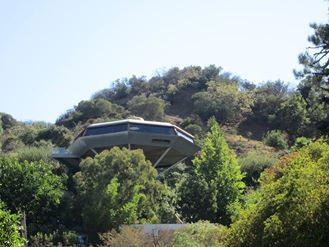
“Heliotrop”, University of Stuttgart’s “sunflower”-house which produces energy using a large photovoltaic sail on its roof:
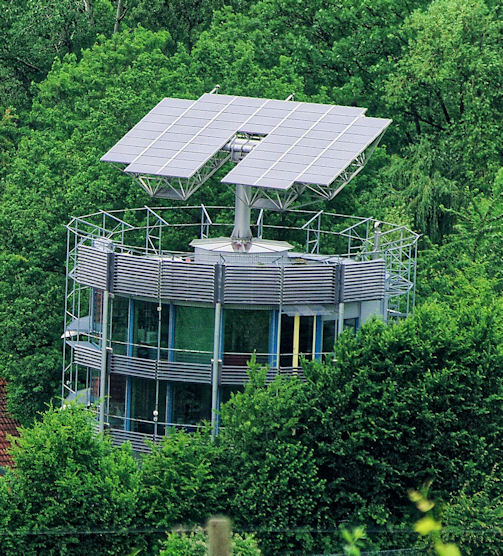
Honouring Gough Whitlam
“Gough Whitlam changed the way Australia thought about itself and gave the country a new destiny. A more inclusive and compassionate society at home – a more engaged and relevant country abroad.
“He snapped Australia out of the Menzian torpor – the orthodoxy that had rocked the country asleep, giving it new vitality and focus. But more than that, bringing Australia to terms with its geography and place in the region.
“Along his journey he also renovated the Labor Party, making it useful again as an instrument of reform to Australian society.
“He will be missed by all who identified with his values and determination to see Australia a better place. But no one will miss him more than his family.”
From the SMH, that was Paul Keating’s summary. That will do me. If you start listing how he changed Australia, you are bound to miss something important, no matter how long the list. He was like no other. Comparison’s are pointless.
This morning I woke to Gerard Henderson on local ABC being mean-spirited about Whitlam’s “incompetence” and a prime minister. The ABC’s idea of ‘balance’. Other than that comments have been universally positive. Certainly politics was always interesting when Whitlam was in power, and he had some wild men in his cabinet.
For my own experience, two things stand out.
Firstly, early in 1975 I was separated from my wife and about 20 months later we had an amicably arranged no-fault divorce. Before Whitlam that would not have been possible. What often happened was that one partner engaged a private eye to catch the other in a compromising situation. Someone had to be at fault. In our case there was nothing to see. The marriage had simply ceased to work.
Secondly, when Whitlam was elected I was the first ever Supervisor, School Library Service, for the Queensland Government. School libraries had been in a dreadful state, but some progress had been made with the Commonwealth funded Secondary Schools Libraries Program. For primary schools we were trying to improve things but there was a desperate lack of resources.
Come the Whitlam government and we soon had a primary schools library program, plus lots of special needs programs and massive general funds for schools generally. I remember visiting Catholic parish primary schools that were literally falling down. I remember talking to a private school headmaster who said that he had always assumed that private school facilities were better. Not now. Government schools were building facilities as good or better than anything the private schools had to offer.
Overall, I recall for the first time feeling proud to be an Australian. We no longer had to apologise on multiple fronts.
This morning I learned something new about Whitlam. Susan Mitchell, who has a biography of Margaret Whitlam coming out soon, said he was actually a very shy man. And absolutely hopeless at small talk. Margaret had to cover that department for him.
My favourite story about Gough was the time he took the press gallery down to Manly beach. Gough strode out upon the waters, turned around, waved to the gallery and strode back to land without getting his feet wet. The headlines next day?
-
GOUGH WHITLAM CAN’T SWIM!
May he rest in peace. We will never see his like again.
Here’s Clifton Pugh’s 1972 portrait:
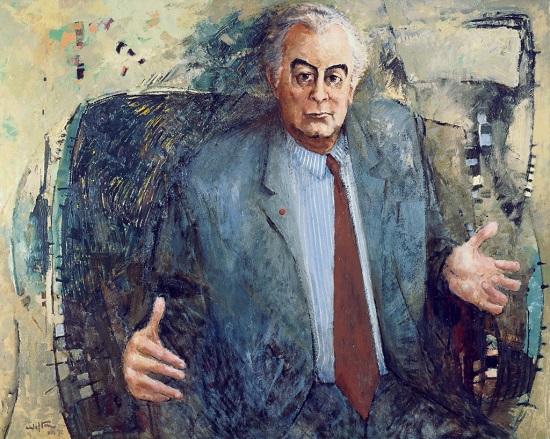
Update: Be sure to check out wpd’s list of achievements @ 2.
Update 2:
John Quiggin has done an excellent assessment of Gough Whitlam.
More than any other Australian political leader, and arguably more than any other political figure, Gough Whitlam embodied social democracy in its ascendancy after World War II, its high water mark around 1970 and its defeat by what became known as neoliberalism in the wake of the crises of the 1970s.
In all of this Whitlam is emblematic of the social democratic era of the mid-20th century. Despite the resurgence of financialised capitalism, which now saturates the thinking of all mainstream political parties, the achievements of social democracy remain central to our way of life, and politicians who attack those achievements risk disaster even now.
With the failure of the global financial system now evident to all, social democratic parties have found themselves largely unable to respond. We need a renewed movement for a fairer society and a more functional economy. We can only hope for a new Whitlam to lead that movement.
Elsewhere there’s Phillip Adams’ repeat of the 20th anniversary of the Dismissal.
Simpson Desert crossing 1: Mt Dare to Purni Bore
It was a long day, our first day in the desert, with some severe landscapes and four bodies of water. Within the first hour we had our first technical hitch (see earlier post) where a tap on our largest water container turned itself on, watering the road with about 17 litres of water before we remedied the situation: Continue reading Simpson Desert crossing 1: Mt Dare to Purni Bore
Saturday salon 18/10

An open thread where, at your leisure, you can discuss anything you like, well, within reason and the Comments Policy. Include here news and views, plus any notable personal experiences from the week and the weekend.
For climate topics please use the most recent Climate clippings.
The gentleman in the image is Voltaire, who for a time graced the court of Frederick II of Prussia, known as Frederick the Great. King Fred loved to talk about the universe and everything at the end of a day’s work. He also used the salons of Berlin to get feedback in the development of public policy.
Fred would only talk in French; he regarded German as barbaric. Here we’ll use English.
The thread will be a stoush-free zone. The Comments Policy says:
The aim [of this site] is to provide a venue for people to contribute and to engage in a civil and respectful manner.
Here are a few bits and pieces that came to my attention last week.
1. National curriculum review
The Conversation asked several experts to comment on the Review of the Australian Curriculum conducted by Dr Kevin Donnelly and Professor Ken Wiltshire. As far as I can make out, the Government will make a final response by early next year and hopes that changes can be implemented by the states in 2016.
This is insane.
The Review seems to call for a rewriting of the entire curriculum, a task which would take years.
Moreover, the Review calls for a restructuring of the Australian Curriculum Assessment and Reporting Authority (ACARA), the body which would do the rewriting, which will take time. It seems unlikely that the states will have the capacity to undertake the necessary curriculum development themselves.
The Review itself seems to be based on opinion rather than research.
2. Calls to sack curriculum reviewer
One such opinion is that of Professor Barry Spurr of Sydney University, who was used as a consultant to review the teaching of English. Spurr has been suspended while the university investigates calls for his sacking. As reported on PM calls for his sacking:
follow the publication of a series of emails in which Professor Barry Spurr described Aboriginal people as “human rubbish tips” and reminisced about the 1950s, when there weren’t so many “bogans”, “fatsoes”, “Mussies” and “Chinky-poos” around.
In his review, Professor Spurr advised the Government to focus less on teaching Aboriginal and Torres Strait Islander literature and place greater emphasis on western Judeo-Christian culture.
On reading the original New Matilda report it’s hard to accept that his racist, sexist ranting is merely whimsical word games. See also here and here.
3. Classics in the English curriculum
While we are at it, Stewart Riddle and Eileen Honan took a look at the curriculum review and English literature. Remember that the Review
advised the Government to focus less on teaching Aboriginal and Torres Strait Islander literature and place greater emphasis on western Judeo-Christian culture.
They found that the national curriculum leaves the selection of texts entirely up to the schools. In fact as a result students already get a steady diet of the classics. But they probably don’t read the Bible or as six year-olds commit mediaeval verse to memory as suggested by the reviewers.
4. Five new growth centres for science and innovation
The Federal Government’s adding an extra $400 million to the science and technology budget. Five new “growth centres” are at the heart of the plan – mining, oil and gas, medical, food and advanced manufacturing.
The Government says that should boost growth and create jobs by encouraging co-operation between those sectors and the scientific community.
Sounds wonderful if you stop right there. But then this:
But the new centres will replace some existing co-operative research centres and it’s not clear what it will mean for the nation’s top research body, the CSIRO.
Opposition spokesman Kim Carr is allowed a very general criticism. I heard him later on RN’s Drive. Apparently Labor had instituted 12 such centres, which were slashed by the LNP. Also the cutbacks to research, science and innovation total a whopping $9 billion.
The headline says $400 million, but the article specifies only $188 million of government funds.
Hockey’s plan to shrink Australia continues apace!
Ebola: how bad will it be?
In Guinea, Sierra Leone and Liberia, three neighbouring West African countries, Ebola seems to be out of control. This is a graph of the numbers of new cases with projections for the next four weeks in lighter blue:
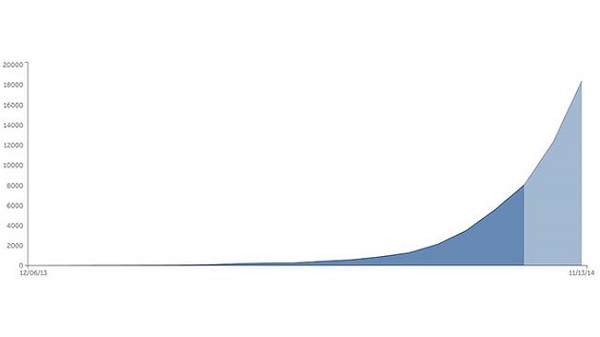
So far there have been about 8,400 cases and some 4,000 deaths. There are claims that cases in Liberia are doubling every 15-20 days while those in Sierra Leone are doubling every 30-40 days. By the end of the year there could be as many as 18,000 new cases weekly.
I’m impressed though that there has been no spread to other African countries other than Nigeria, where it appears to have been contained. One case surfaced in Lagos in July with 19 subsequent infections. However, the chain of contagion seems to have been broken.
On the other hand subsequent infections in the US, where a second health care worker has tested positive, and Spain are cause for concern.
You can read very different views of the potential impact of the disease worldwide. This Nature article is quite definite that the Ebola does not represent a global threat. The virus is too hard to catch and advanced country health systems are too sophisticted. By contrast this New York Times piece worries about the virus gaining a foothold in a mega-city somewhere else in the developing world. I’d worry about India and the capacity of its health system to cope.
The current outbreak is the first time the disease has gained a foothold in urban areas.
A second worry is that the virus may become airborne. C Raina MacIntyre, who is Professor of Infectious Diseases Epidemiology and Head of the School of Public Health and Community Medicine at UNSW, points out that experienced health care workers who have contacted the disease have not been able to identify how they caught it. The assumption is simply that there has been a breach in protocol. We keep being assured that the disease is hard to catch. While the long incubation phase, up to three weeks, does not help memory, the fact that it keeps happening in ways that can’t be precisely pinpointed is troubling.
Still, the circumstances that saw the disease take hold in West Africa are unlikely to be repeated. This Vanity Fair article explains how the spread of Ebola was assisted by unique circumstances.
Firstly Ebola was not identified for three and a half months. The disease was virtually unknown in West Africa; earlier outbreaks had been in central and east Africa. At first cholera, then Lassa fever were suspected. By the time Ebola was identified the disease had already spread to a number of towns, including a bustling trade hub.
The reaction of first world agencies was swift. After identification in late March, Guinea was invaded by strange robotic white people who came in space suits and took ill people away.
The foreigners had come so fast that they had actually out-run their own messaging: there were trucks full of foreigners in yellow space suits motoring into villages to take people into isolation before people understood why isolation was necessary.
To a villager, the isolation centers were fearsome places. They offered a one-way maze through white tarpaulins and waist-high orange fencing. Relatives or friends went in and then you lost them. You couldn’t see what was happening inside the tents—you just saw the figures in goggles and full-body protective gear. The health workers move carefully in order to avoid tears and punctures; from a distance, the effect is robotic. The health workers don’t look like any people you’ve ever seen. They perform stiffly and slowly, and then they disappear into the tent where your mother or brother may be, and everything that happens inside is left to your imagination. Villagers began to whisper to one another—They’re harvesting our organs; they’re taking our limbs.
The people in Guinea were as frightened by the response to Ebola as they were by Ebola itself. By May the cases dried up and the aid agencies started to relax. In fact the sick were hiding, as soon became apparent.
Rather than under control the reverse was true, the epidemic was completely out of control. While new strategies are gaining the trust of the people, the disease has outrun attempts to contain it.
There must be a huge effort to contain the disease within the three countries where then disease is endemic while a vaccine, currently under development, is fast tracked. As to Guinea, Liberia and Sierra Leone, we can’t just write off a combined population of over 20 million people. Health workers are in the front line and these countries human health worker resources are being depleted by the disease. Liberia has only 250 doctors left for 4 million people, that’s one for every 16,0000 people.
Yet Australia has seen no great obligation to help. Officially I understand we have supplied about $18 million in aid, a pathetic amount, while our fearless prime minister has said that it is too dangerous for us to put boots on the ground. Yet there is work to be done out of direct contact with patients, in building temporary field hospitals, for example. Our PM could show just a bit of compassion and genuine humanitarian concern.
We Could Learn a lot from the Scandinavians
The Conversation has run this interesting article suggesting that we could learn a lot from the Scandinavian Countries re Public policy. It is all about comparing countries with a long history of governing to improve the welfare of the people and accepting high taxes with our far less people friendly policies that help minimize the taxes of the rich.
Funny thing is that people like the Yanks have been saying for years that what the Scandinavians are doing will wreck the economy despite the durable success of the Scandinavian countries. The Yanks and clowns like Hockey don’t seem to understand that good health, excellent education, a fairer distribution of income etc. actually help economies stay healthy.
Worth a read and worth discussion.
The OECD has identified Australia as one of a small number of countries in which long working hours are common. In comparison, parents in Sweden and the other main Nordic countries have working weeks shorter than the OECD average. This is in addition to their substantial paid parental leave and publicly provided child care.
Shorter working hours allow parents from Sweden to pick up their children after work without the time pressures Australian parents face.
Australia will probably move to make child-care centre hours more flexible to suit our long working hours. However, the government should encourage shorter working hours, which are more compatible with family life.
Saturday salon 11/10

An open thread where, at your leisure, you can discuss anything you like, well, within reason and the Comments Policy. Include here news and views, plus any notable personal experiences from the week and the weekend.
For climate topics please use the most recent Climate clippings.
The gentleman in the image is Voltaire, who for a time graced the court of Frederick II of Prussia, known as Frederick the Great. King Fred loved to talk about the universe and everything at the end of a day’s work. He also used the salons of Berlin to get feedback in the development of public policy.
Fred would only talk in French; he regarded German as barbaric. Here we’ll use English.
The thread will be a stoush-free zone. The Comments Policy says:
The aim [of this site] is to provide a venue for people to contribute and to engage in a civil and respectful manner.
Here are a few bits and pieces that came to my attention last week.
1. Malala Yousafzai and Kailash Satyarthi win the 2014 Nobel Peace Prize
At 17, Pakistani education rights activist Malala Yousafzai is the youngest-ever winner of the prize. She first came to global attention in 2012, when a Taliban gunman attempted to assassinate her on her school bus. After surgery and rehabilitation in the UK, she has become an international advocate for access to education, in particular for girls who are denied opportunities to learn.
Indian activist Kailash Satyarthi, who shares the prize with Yousafzai, is the founder of the Bachpan Bachao Andolan movement. The organisation, which Satyarthi formed in 1980, campaigns against child labour and human trafficking in South Asia.
2. Dr Catherine Hamlin nominated for Nobel Peace Prize
The Ethiopian Government nominated 90 year-old Australian doctor Dr Catherine Hamlin for the prize in recognition for her work with women suffering obstetric fistula during childbirth. The hospitals she helped establish treat over 2500 women each year. She travelled with her late husband Dr Reg Hamlin to Ethiopia 55 years ago to train midwives and stayed on.
Would you believe, other nominations included Russian president Vladimir Putin, who was nominated earlier this year for his role in dismantling Syrian chemical weapons stockpiles.
3. Saudis crack down on political dissidents
The new laws have largely been brought in to combat the growing number of Saudis travelling to take part in the civil war in Syria, who have previously returned with newfound training and ideas about overthrowing the monarchy.
To that end, King Abdullah issued Royal Decree 44, which criminalises “participating in hostilities outside the kingdom” with prison sentences of between three and 20 years, Human Rights Watch said.
But the laws go beyond those concerns to anything which could “harm public order”. This includes defining atheists as terrorists.
4. Dozens of anti-Muslim attacks as Islamic leaders warn of community fear
There have been at least 30 attacks on Muslims – mainly against women wearing the hijab – in the three weeks since the police anti-terror raids and threats by Islamic State put relations between the Islamic community and mainstream Australia on edge.
Muslim community leaders are compiling a register of religiously motivated incidents, which includes reports of physical and verbal assaults, threats of violence against senior clerics and damage to mosques.
Escorts are being arranged for women to go shopping.
Queensland has the highest rate of personal assaults and threats to mosques, according to the list.
5. Feral cats rewrite the Australian story
There are between 15 and 23 million feral cats in Australia. Each night they chomp their way through about 75 million native animals.
Campaigns to eradicate foxes have backfired where they have been tried. Initial success has been followed by an explosion of the feral cat population leaving native wildlife worse off.
Other predators include the dingo and the Tasmanian devil.
6. Phillip Adams’ favourite interviews
To coincide with Phillip Adams’ induction into the Melbourne Press Club hall of fame, the host of RN’s Late Night Live has assembled a list of some of his favourite recent interviews from his ‘little wireless program’, featuring everyone from Magda Szubanski to Oliver Stone.

